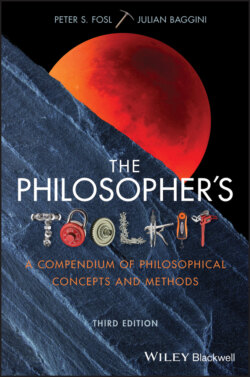Читать книгу The Philosopher's Toolkit - Julian Baggini, Julian Baggini - Страница 23
1.2 Deduction
ОглавлениеThe murder was clearly premeditated, Watson. The only person who knew where Dr Fishcake would be that night was his colleague, Dr Salmon. Therefore, the killer must be …
Deduction is the form of reasoning that is often emulated in the formulaic drawing‐room denouements of classic detective fiction. It is the most rigorous form of argumentation there is, since in deduction the move from premises to conclusions is such that if the premises are true, then the conclusion must (necessarily) also be true. For example, take the following argument:
1 Elvis Presley lives in a secret location in Idaho.
2 All people who live in secret locations in Idaho are miserable.
3 Therefore, Elvis Presley is miserable.
If we look at our definition of a deduction, we can see how this argument fits the bill. If the two premises are true, then the conclusion must also definitely be true. How could it not be true that Elvis is miserable, if it is indeed true that all people who live in secret locations in Idaho are miserable, and Elvis is one of those people?
You might well be thinking there’s something fishy about this, since you may believe that Elvis is not miserable for the simple reason that he no longer exists. So, all this talk of the conclusion having to be true might strike you as odd. If this is so, you haven’t taken on board the key word at the start of this sentence, which does such vital work in the definition of deduction. The conclusion must be true if the premises are true. This is a big ‘if’. In our example, the conclusion is, we confidently believe, not true and for very good reasons. But that doesn’t alter the fact that this is a deductive argument, since if it turned out that Elvis does live in a secret location in Idaho and that all people who lived in secret locations in Idaho are miserable, it would necessarily follow that Elvis is miserable.
The question of what makes a good deductive argument is addressed in more detail in the section on validity and soundness (1.4). But in a sense, everything that you need to know about a deductive argument is contained within the definition just given: a (successful) deductive argument is one where, if the premises are true, then the conclusion is definitely true.
Before we leave this topic, however, we should return to the investigations pursued by our detective. Reading his deliberations, one could easily insert the vital, missing words. The killer must surely be Dr Salmon. But is this the conclusion of a successful deductive argument? The fact is that we can’t answer this question unless we know a little more about the exact meaning of the premises.
First, what does it mean to say the murder was ‘premeditated’? It could mean lots of things. It could mean that it was planned right down to the last detail, or it could mean simply that the murderer had worked out what she would do in advance. If it is the latter, then it is possible that the murderer did not know where Dr Fishcake would be that night, but, coming across him by chance, put into action her premeditated plan to kill him. So, it could be the case (1) that both premises are true (the murder was premeditated, and Dr Salmon was the only person who knew where Dr Fishcake would be that night) but (2) that the conclusion is false (Dr Salmon is, in fact, not the murderer). Therefore, the detective has not formed a successful deductive argument.
What this example shows is that, although the definition of a deductive argument is simple enough, spotting and constructing successful deductive arguments is much trickier. To judge whether or not the conclusion really must follow from the premises, you have to be sensitive to ambiguity in the premises as well as to the danger of accepting too easily a conclusion that seems to be supported by the premises but does not in fact follow from them. Deduction is not about jumping to conclusions, but crawling (though not slouching) slowly towards them.
